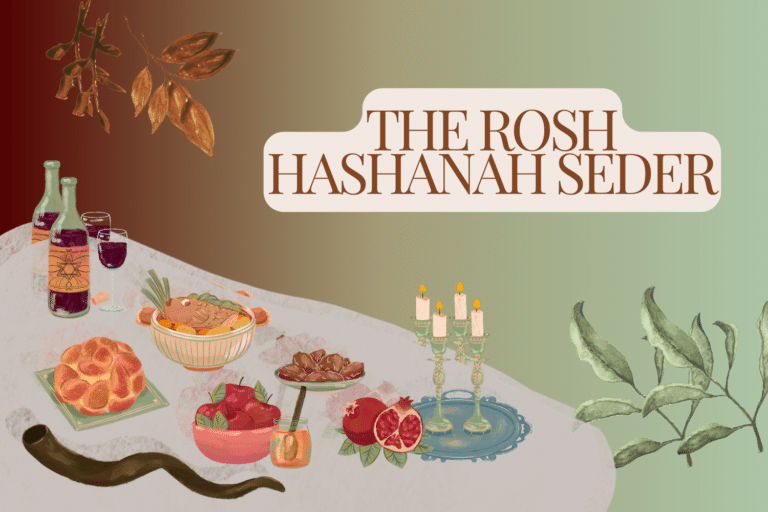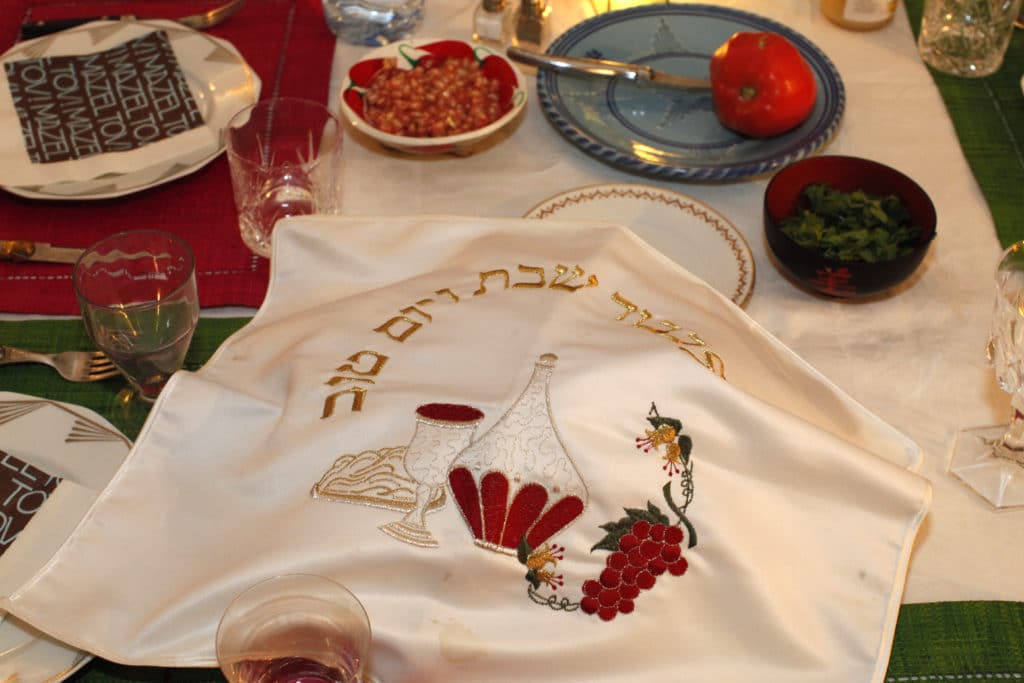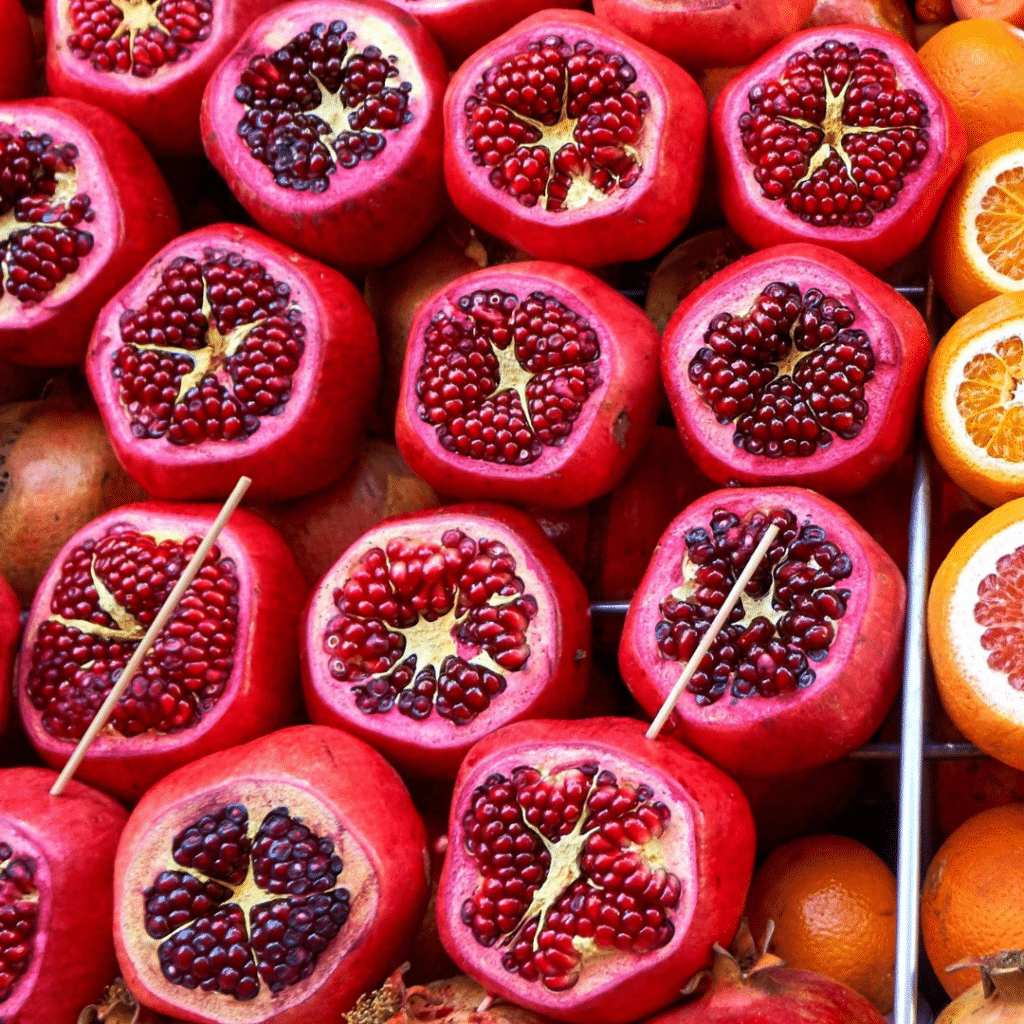
You’re probably familiar with the Passover seder — matzah, lots of wine and the classic seder plate. Although this is the most (shall we say) famous of the holiday seders, it’s actually not the only one. Sephardic Jews have been hosting seders to mark Rosh Hashanah, the Jewish New Year, for thousands of years.
As it happens, Rosh Hashanah traditions are much more varied than dipping apples in honey or serving round challah. There are dozens of other unique Jewish new year customs spanning the globe. Hosting a (Passover-like) seder is one of the most popular. Although primarily a Sephardic tradition, hosting a seder on one or both nights of Rosh Hashanah has gained popularity outside of Sephardic communities in Israel and across the world.
Read more: All your Rosh Hashanah questions, answered
The word seder is Hebrew for “order.” So really, it can be used to describe anything done in a particular order. Passover or Rosh Hashanah seders get their name from the specific order in which the blessings are recited.
Similar to the Passover seder, blessings are said over wine, washing of the hands and symbolic foods, called simanim in Hebrew. On Passover, foods like bitter herbs and matzah symbolize suffering and freedom, whereas foods at the Rosh Hashanah seder represent a prayer for a sweet year ahead.
Each of the simanim symbolize a different hope or wish for the new year. These include:
- Dates
- Small light-colored beans
- Leeks
- Beets
- Gourds
- Pomegranates
- Apples and honey
- Head of fish or cheek meat of a cow

Blessings for each siman
Dates:
Take a date and recite:
בָּרוּךְ אַתָּה ה’ אֱלֹהינוּ מֶלֶךְ הָעוֹלָם בּוֹרֵא פְּרִי הָעֵץ
Blessed are You, Lord our G‑d, King of the universe, who creates the fruit of the tree.
After eating the date, take another one and say:
יְהִי רָצוֹן מִלְּפָנֶיךָ ה’ אֱלֹהינוּ וֵאלֵֹהי אֲבוֹתֵינוּ, שֶׁיִּתַּמּוּ אוֹיְבֵינוּ וְשׂוֹנְאֵינוּ וְכָל מְבַקְשֵׁי רָעָתֵנוּ
May it be Your will, Lord our G‑d and the G‑d of our fathers, that there come an end to our enemies, haters and those who wish evil upon us.
Small beans:
Take some white beans and say:
יְהִי רָצוֹן מִלְּפָנֶיךָ ה’ אֱלֹהינוּ וֵאלֵֹהי אֲבוֹתֵינוּ, שֶׁיִּרְבּוּ זָכִיּוֹתֵינוּ וּתְלַבְּבֵנוּ
May it be Your will, Lord our G‑d and the G‑d of our fathers, that our merits shall increase and that You hearten us.
Leeks:
Take a leek and say:
יְהִי רָצוֹן מִלְּפָנֶיךָ ה’ אֱלֹהינוּ וֵאלֵֹהי אֲבוֹתֵינוּ, שֶׁיִּכָּרְתוּ אוֹיְבֵינוּ וְשׂוֹנְאֵינוּ וְכָל מְבַקְשֵׁי רָעָתֵנוּ
May it be Your will, Lord our G‑d and the G‑d of our fathers, that our enemies, haters, and those who wish evil upon us shall be cut down.
Beets:
Take a beet and say:
יְהִי רָצוֹן מִלְּפָנֶיךָ ה’ אֱלֹהינוּ וֵאלֵֹהי אֲבוֹתֵינוּ, שֶׁיִּסְתַּלְּקוּ אוֹיְבֵינוּ וְשׂוֹנְאֵינוּ וְכָל מְבַקְשֵׁי רָעָתֵנוּ
May it be Your will, Lord our G‑d and the G‑d of our fathers, that our enemies, haters and those who wish evil upon us shall depart.
Gourds:
Take a gourd and say:
יְהִי רָצוֹן מִלְּפָנֶיךָ ה’ אֱלֹהינוּ וֵאלֵֹהי אֲבוֹתֵינוּ, שֶׁתִּקְרַע רוֹעַ גְּזַר דִּינֵנוּ, וְיִקָּרְאוּ לְפָנֶיךָ זָכִיּוֹתֵינוּ
May it be Your will, Lord our G‑d and the G‑d of our fathers, that the evil of our verdicts be ripped, and that our merits be announced before you.
Pomegranates:
Take the pomegranate and say:
יְהִי רָצוֹן מִלְּפָנֶיךָ ה’ אֱלֹהינוּ וֵאלֵֹהי אֲבוֹתֵינוּ, שֶׁנִּהְיֶה מְלֵאִים מִצְוֹת כָּרִמּוֹן
May it be Your will, Lord our G‑d and the G‑d of our fathers, that we be filled with mitzvot like a pomegranate [is filled with seeds].
Apples and Honey:
Dip an apple in honey (some have the custom of using an apple cooked with sugar) and say:
יְהִי רָצוֹן מִלְּפָנֶיךָ ה’ אֱלֹהינוּ וֵאלֵֹהי אֲבוֹתֵינוּ, שֶׁתְּחַדֵּשׁ עָלֵינוּ שָׁנָה טוֹבָה וּמְתוּקָה כַּדְּבָשׁ
May it be Your will, Lord our G‑d and the G‑d of our fathers, that You renew for us a year good and sweet like honey.
Fish Head:
יְהִי רָצוֹן מִלְּפָנֶיךָ ה’ אֱלֹהינוּ וֵאלֵֹהי אֲבוֹתֵינוּ, שֶׁנִּהְיֶה לְרֹאשׁ וְלֹא לְזָנָב
May it be Your will, Lord our G‑d and the G‑d of our fathers, that we be a head and not a tail.
Read more: Rosh Hashanah guide 2024: How and when to celebrate the Jewish New Year
Origins of the Rosh Hashanah seder
The tradition of having a Rosh Hashanah seder goes back to Talmudic times. In Horayot 12a, Rabbi Abaye highlights omens that carry significance. “A person should always be accustomed to seeing these [simanim] on Rosh Hashanah… as each of these grows quickly and serves as a positive omen for one’s actions during the coming year.”
In the late 19th century, the Baghdadi rabbi Hakham Yosef Hayyim also mentioned the ceremony in his compilation of Jewish law and practice.
Yehi Ratzones
Some families refer to the ceremony of reciting the blessings for each siman as the Yehi Ratzones, referring to the words “Yehi Ratzon” (“May it be Your will …”) recited at the start of the prayer for each of the simanim.
The symbolic foods also represent a play on Aramaic and Hebrew words. For example, dates symbolize the hope that our enemies disappear because the Aramaic word for “date” is similar to a Hebrew word for “end.”
The fish head or cheek meat symbolize the hope that “we may be the head and not the tail.” Instead of a fish head, many vegan or vegetarians use a head of cauliflower, cabbage or even eat the head of Swedish fish candies.
Some families add a cooked fish siman to the platter and pray “that our merits may multiply as the fish in the sea.”
Trying a new fruit

It is traditional to try something new in advance of Rosh Hashanah. You could try a new hobby, visit a new place or learn a new skill. Some people buy new clothes to wear for the first time on Rosh Hashanah.
During the seder, it’s common to eat a new, seasonal fruit or a fruit that you have not tasted for a long time, in order to literally taste the newness of the year. Often, pomegranates are served for this purpose. Pomegranates also hold unique symbolism. According to Jewish folklore, pomegranates have 613 seeds, corresponding to the 613 mitzvot (commandments).
In Jewish tradition, pomegranates symbolize fertility and abundance, representing unlimited possibilities for the new year. Many add a prayer for pomegranates to express the hope that “our merits increase as the seeds of the pomegranate.”
Customize your seder to be meaningful for you
When it comes to the Rosh Hashanah seder, every family has unique traditions. Many will do the blessings over the simanim before starting the meal, to usher in a sweet new year. Some turn the simanim into a festive salad.
“My uncle does a siman where he eats half a raisin with celery, to ‘have a raise in salary,’” one Unpacked staff member noted.
This is a perfect time to be creative and incorporate elements that are meaningful to you.
For a deeper look into a traditional Sephardic seder and more simanim and blessings, check out the Bendichas Manos blog.
